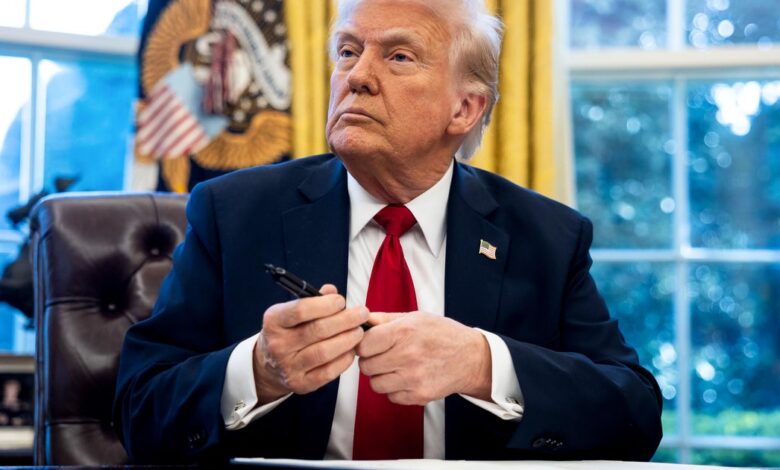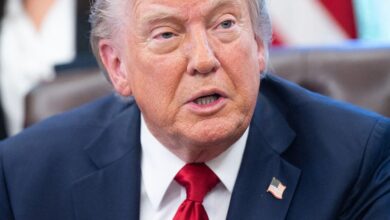Trump live updates on “Liberation Day” as U.S. braces for new tariffs

Trump’s trade policies could lead to a global trade war. The announcement of reciprocal tariffs on nearly all U.S. trading partners has been a topic of speculation and uncertainty. White House press secretary Karoline Leavitt stated that the tariffs would go into effect immediately, but the specifics of the plan, such as the tariff rates and targeted countries, have not been disclosed yet.
President Trump’s trade team is still finalizing the details of the plan, leaving businesses and investors in anticipation of the potential impact on the economy. The goal of the tariffs, according to Leavitt, is to bring back manufacturing jobs, enhance American competitiveness across industries, reduce trade deficits, and safeguard economic and national security interests.
As the announcement looms, the stock market has been cautiously optimistic, with stocks edging up as investors await further clarification on the tariffs. The uncertainty surrounding the trade policies has led to fluctuations in financial markets, and investors are closely monitoring the situation for any developments that could affect their portfolios.
The outcome of Trump’s tariff announcement is expected to have far-reaching implications for the global economy, as countries brace for potential retaliatory measures and disruptions in trade relations. The impact of the tariffs on various industries and sectors remains to be seen, but businesses are preparing for potential changes in supply chains, production costs, and market dynamics.
In the midst of trade tensions and economic uncertainties, the Trump administration’s tariff announcement is a crucial moment that could shape the future of international trade and commerce. Businesses and investors are awaiting further details and clarity on the plan to assess its potential implications and adjust their strategies accordingly.
With these new tariffs in place, American consumers and businesses may feel the pinch in their wallets. The higher costs of imported vehicles and auto parts could lead to a decrease in spending on big-ticket items, such as cars, which could have a ripple effect on the overall economy.
Businesses that rely on imported auto parts may also see their bottom line affected, leading to potential layoffs or cutbacks in production. This could further dampen economic growth and potentially lead to a slowdown in the manufacturing sector.
Additionally, the uncertainty surrounding the tariffs and their impact on the economy may cause investors to take a more cautious approach, leading to volatility in the stock market.
Overall, Trump’s economic policies, including the implementation of auto tariffs, have the potential to disrupt consumer and business spending, which could ultimately hurt economic growth in the long run.
Smaller automakers like Subaru and Mazda, who import a significant portion of their vehicles from overseas, are also expected to be heavily impacted. Luxury brands like BMW and Mercedes-Benz, which import a large number of vehicles from Europe, could also see higher prices for consumers.
Electric car manufacturers like Tesla may also feel the effects of the tariffs, as they rely on imported components for their vehicles. This could result in higher prices for electric cars, making them less competitive in the market.
Overall, the new tariffs are expected to raise prices for consumers across the board, with some automakers passing on the increased cost to customers. This could result in a decrease in sales for certain brands, as consumers may opt for more affordable options in the face of higher prices.
It remains to be seen how automakers will navigate the challenges posed by the new tariffs and whether they will be able to adjust their production and pricing strategies to mitigate the impact on their bottom line.
Trump should focus more on prices than tariffs, according to a recent CBS News poll. This sentiment comes as the automotive industry braces for potential impacts from tariffs on imported cars. With the possibility of increased tariffs looming, consumers are concerned about the potential effects on car prices and availability.
Experts predict that certain car models may be more heavily impacted by tariffs than others. Luxury vehicles, which are often imported from Europe and Asia, could see a significant price increase if tariffs are imposed. These cars are already priced at a premium, and additional tariffs could make them even more expensive for consumers.
In addition to luxury vehicles, smaller, fuel-efficient cars may also be impacted by tariffs. Many of these models are imported from countries like Japan and South Korea, which could be targeted by tariff increases. This could make it more expensive for consumers to purchase these popular vehicles.
On the other hand, domestically-produced cars may see less of an impact from tariffs. American-made vehicles, especially those manufactured by companies with domestic production facilities, may be able to avoid some of the added costs associated with tariffs on imported cars.
Overall, the potential impact of tariffs on the automotive industry remains uncertain. While some car models may see price increases, others may be able to weather the storm. Consumers will need to stay informed and be prepared for possible changes in the market as the situation develops.
As the debate over tariffs continues, it is clear that consumers are looking for solutions that will keep car prices affordable and ensure a wide range of options in the market. The outcome of this issue will have a significant impact on the automotive industry and the choices available to consumers in the coming months.
For a breakdown of which cars may be most impacted by potential tariffs, please visit the link here.
Written by Megan Cerullo. Published on April 2, 2025.





